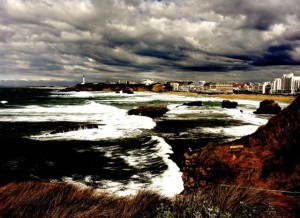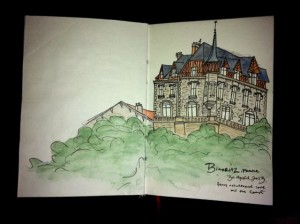On Travel, and Stories.
Recently, as I was sitting at lunch with one of my dear friends, meeting her mother for the first time, we cracked open a bottle of wine and delved into stories. Travel stories, stories about people, about ourselves, about the past and how it leads into our hopes for the future. With the newfound presence of her mother, the lens to access these familiar stories was changed; a new perspective was present, which lead to an entirely new presentation and projection of these past experiences.
The truth is, most of my stories are largely untold. I travel to collect them, to garner these experiences which I tuck somewhere in the back of my heart, and they stumble out with strangers, occasionally with friends, and in short anecdotes or jokes, with family. I rarely know what stories I will tell. Sometimes I feel stuffed with so many stories that none of them will come out, that I’ll continually be an overstuffed cookie bear with all the cookies smashed up inside losing their shape and context. The chocolate melts into the dough and I can’t remember which flight it was, what country that was, who it was I shared that coffee with, where exactly this piece of clothing came from.
Yet, when I travel, my stories are vivid, they are present, they are shared. It is so easy to meet other travelers, some of whom have similar experiences, and what begins as a meeting turns into an exchange of memories. Details are sometimes so similar that one is able to immediately feel a connection with a stranger, and a greater web of connection between humanity is begun. It might be meeting a local from one of the countries I have traveled, such as meeting Germans in southern Spain, cracking jokes about Darmstadt and bananabier. It may be meeting another traveler who has had a similar experience, and in discovering such similarities we are able to instantly bond: such as meeting an Australian girl who was similarly berated at customs while trying to get into the United Kingdom, or meeting a French couple and exchanging stories and emotions about how families in Nepal were so incredibly willing to open their homes and their hearts, or meeting a Slovenian girl whose dream is to go to Korea. Sometimes it is merely a shared desire to go to a country: daydreaming about the mystical natural beauty of Laos; talking about Croatia or Greece or Turkey; getting lost in stories you’ve only heard from others about Costa Rica, or Peru, or Chile.
Sometimes the connection may consist of meeting someone from home who has similar mindsets and misses similar things. The nearness of your common heartbeat is a unique comfort: understanding the value of a hug over a kiss, missing traditional American-style coffee, talking about the beauty of lazy Minnesota cabin days and how summer on the lake may be the most perfect place in all the world.
I travel to learn empathy, to see the world through others’ eyes. I often forget the boundaries of my self when traveling, losing the edges of my American accent, passively following instead of speaking my mind, unable to decide on a place to eat despite hunger tearing up and receding into a dull ache as my feet pass restaurant after restaurant after restaurant, sometimes going to bed hungry because I just don’t feel like going to the effort of making a decision and eating alone.
Yet this aloneness is necessary to create experience, and the stories that result are what bring us together. It is the individual responsibility to garner and stitch together the basic framework of the stories, but it is the people we are lucky enough to meet and share our stories with that give us context, meaning, depth.
I travel to leave and I travel to return home. It is both the coming and the going that gives depth and growth to the human spirit, for it is necessary to understand and witness not only the cultures of others, but to view the culture in which one was raised and to see what is familiar through fresh, foreign eyes: to panic about wasting water as you listen to the sound of friends washing the dishes, to feel despair at the endless expansion of American suburbia, to question whether work ought to be the function and purpose of life, to understand the culture of food in entirely different ways, to question the immediate acceptance we have toward routines and habits that exist merely because, “That’s how it is, that’s how it’s always been,” instead of saying that things ought to be done differently because they could be done better.
The more I travel, the more I realize that there exists no one correct way to live; it is only the circumstances we have and the decisions we make and the priorities we choose that dictate the fullness, depth and experience of our life. It is what we choose to do with what we have, and how seriously we take our selves, the dreams and desires that come out of the heart, and how deeply we respect the lives of others in the decisions we make. Culture, values, food, and climate vary greatly; gender roles, hierarchies of respect, and freedom of decision culturally intersect at polar opposites across the world; the value of work versus play, the value of education, the value of health as a social or individual responsibility are starkly divided. But we are all human, we are all born and we will all reach the end of our life, where we will inevitably die. While spiritual, governmental, cultural and religious systems have all been created to deal with this system of life and death, and these vary greatly in context and practice, we the individuals are integrally, at our very core, the same.
It is my belief that the greatest thing which connects us, as humans, in facilitating understanding across all manner of boundaries, most especially when told with an open heart and mind (those of which create the ability to tolerate varying degrees and understandings of truth), is stories. Each of us is nothing but the stories we have. We need stories, to deepen our self and to connect us with others. Stories to help us remember who we are and to give us understanding of our role among others. We are nothing but the stories we have, and the whole experience of life is given meaning by our ability to share these stories with others.
If this were my rallying cry, I would cry: So go on, go out there! Wherever it is you must go. Live your stories and open your heart and share them with others. This is the life, this is what we have, it is our personal and individual duty to live it as best we can. One day, we will die. We will all die. And our stories will die with us. All we can do is share them now with the people we love. It is the best of what we have, and one of the only ways of understanding who and what we are. Make your stories, be your stories. And if you’re not happy with your stories, make new ones. This is it. Here we are. So go.
***
Are we all happy? John, my adopted English grandfather, asks Esther and me. Are we happy, is it fair? That’s what’s most important. We must be happy, and everything must be divided equally. Are you happy then, my dears?




